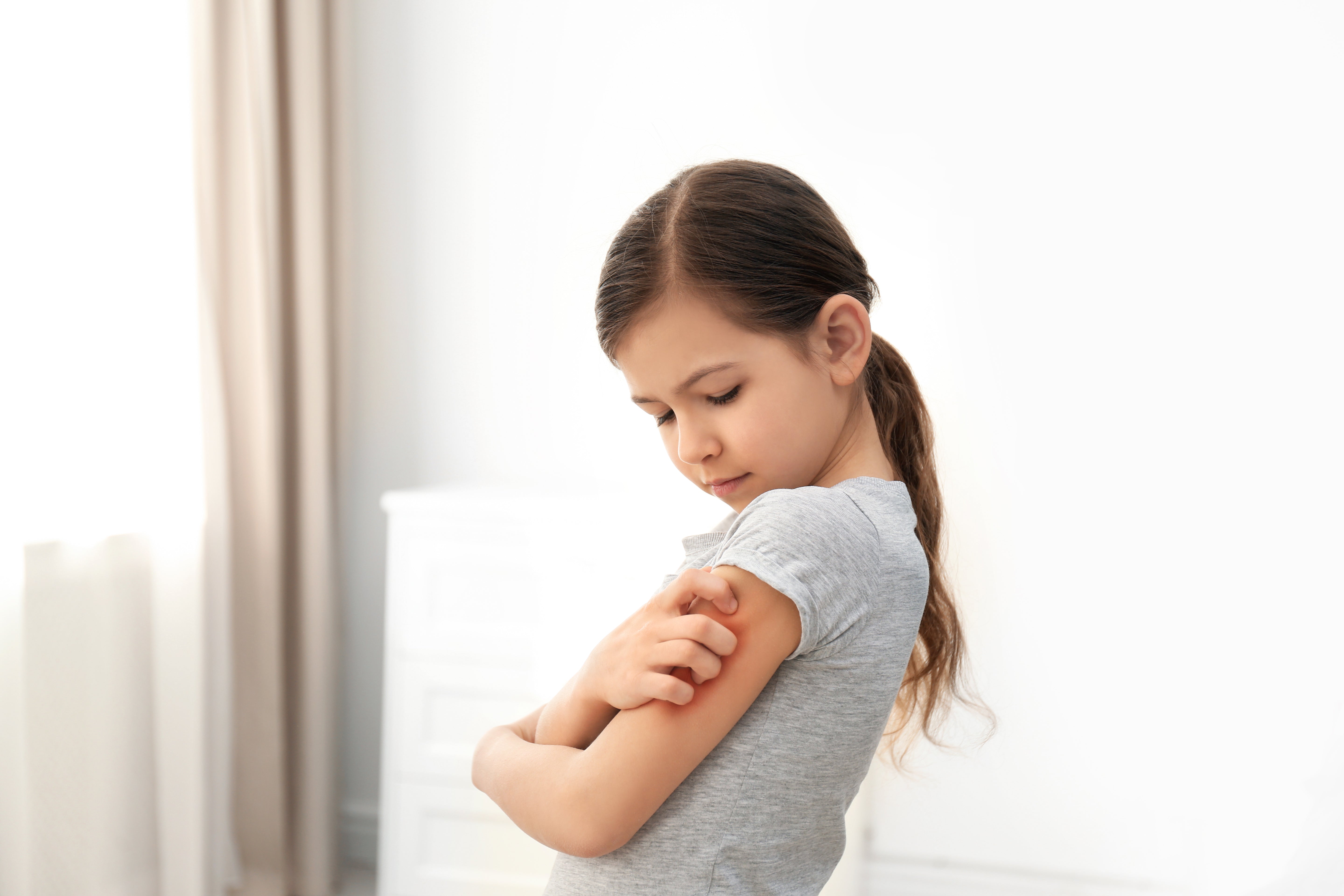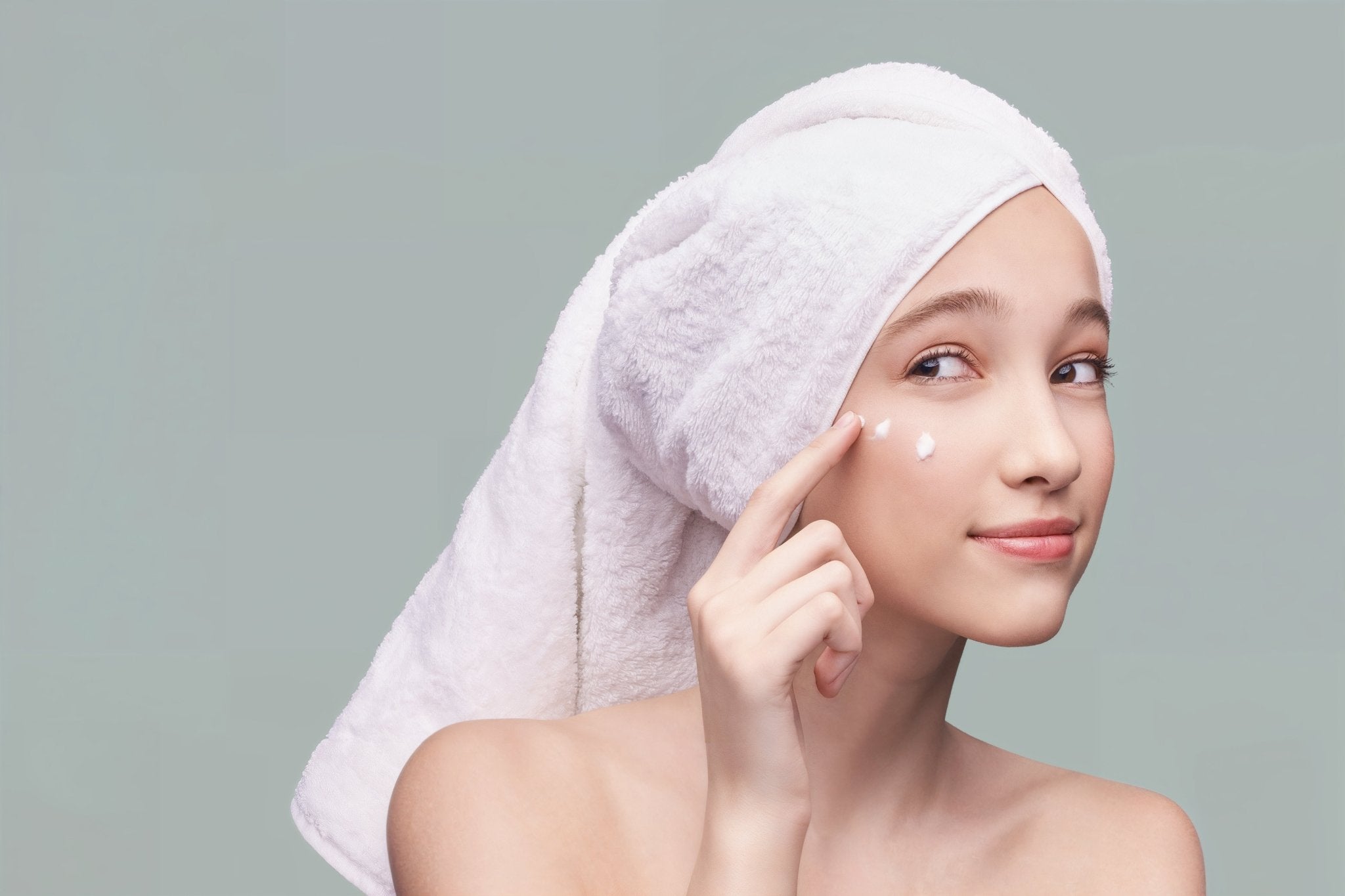Itchy, dry skin is a common dermatological problem affecting people of all ages and skin types. If you experience severe itching with a tight, stinging sensation, it may be due to dry skin (xerosis). Dry skin causes dehydration, which weakens the skin barrier (the protective layer of the skin), making it more sensitive to external aggressions and amplifying the itching.
It's important to remember that skin is our first line of defense against external aggressions like viruses and bacteria. When it's dry, this protection is weakened, which can increase itching and make the skin more vulnerable.
This phenomenon can be aggravated by factors such as seasonal changes (cold or hot), the use of unsuitable skincare products, household products (such as laundry detergents), or certain conditions such as atopic dermatitis or eczema. In this article, we will look at where this itching comes from, the different types of itching, and how to relieve and prevent it.
By better understanding this itching and adopting the right care, it is possible to reduce the discomfort of dry skin and regain softer, more comfortable skin.
Understanding Itchy Dry Skin
What is dry skin?
- Dry skin occurs when the skin doesn't produce enough sebum , a natural oil produced by our sebaceous glands, or enough natural moisturizing factors (NMFs), which help retain water. This disrupts the skin's balance, making it more vulnerable to external aggressors and leading to water loss, making it even drier.
- Natural moisturizing factors (NMFs) are substances found in our skin that help retain water and keep it well hydrated. They are natural elements, such as salts and amino acids, that attract moisture from the air to keep skin supple and soft.
- Symptoms of dry skin include tightness, a feeling of tightness, discomfort, scaling, tingling, redness, irritation, cracking, and a rough, dull texture.
The role of the skin barrier
- The skin barrier , consisting of the horny layer (stratum corneum) and the hydrolipidic film, plays an essential role in protecting the skin . It prevents body dehydration by regulating water loss and maintaining skin hydration.
- This barrier also provides physical, chemical, and antimicrobial protection , preventing irritants and pathogens from penetrating the skin. When this barrier is compromised, as is often seen in individuals with atopic dermatitis or atopic eczema, the skin becomes more susceptible to external aggressions and dehydration, thus aggravating itching and pruritus.
Why does dry skin itch?
- Itching associated with dry skin is primarily a result of dehydration and changes in the skin barrier . Skin deficient in sebum and moisture becomes more sensitive and permeable to irritants, which can trigger inflammatory reactions and intense itching.
- Additionally, the loss of lipids and natural moisturizing factors makes the skin more prone to flaking and irritation, intensifying itching and pruritus. This creates a vicious cycle where scratching, while providing temporary relief, further impairs the skin barrier, exacerbating itching and dryness.
Causes of Itchy Dry Skin
- Environmental factors: Climate plays a crucial role in the onset of itchy, dry skin. In winter, cold, windy, and dry air contribute to skin dehydration and weaken its protective barrier. Weather conditions can cause skin to lose moisture, making it more prone to itching. Summer is also a time to be on the lookout! Summer heat and air conditioners dry out the skin, making hydration even more essential.
- Irritating hygiene products: Using skincare products containing harsh substances, such as sulfate-based soaps or shower gels, can alter the skin's pH balance and remove natural oils, worsening dryness and itching. It is essential to choose gentle, moisturizing, and fragrance-free products.
- Exposure to hot water: Water that is too hot during showers or baths can destabilize the skin barrier by removing protective oils from the skin, which increases the feeling of dryness and promotes itching.
- Cosmetics : Some cosmetics, especially creams or lotions containing perfumes, alcohol, or other chemicals, can irritate the skin, especially when it is already dehydrated. Using makeup or harsh skincare products can cause skin reactions, increasing dryness and itching. It is recommended to choose cosmetics suitable for sensitive skin and moisturizers.
- Exposed occupations: Certain occupations particularly expose individuals to factors that promote dry, itchy skin. For example, hairdressers , who frequently handle chemicals such as dyes and bleaches, as well as water and detergents, often face skin irritations. Similarly, caregivers , cooks , or builders may be more vulnerable due to their regular contact with water, detergents, or potentially drying substances. These professionals often need to take additional measures to protect their skin, such as using gloves, suitable moisturizers, or protective barriers to limit the impact of these factors.
- Children: Children, especially infants and toddlers, have thinner and more fragile skin than adults, making them more vulnerable to dryness and itching. Their skin is also more prone to irritation from harsh hygiene products, changes in climate, or skin conditions such as eczema.
Medical conditions (eczema, psoriasis, atopic dermatitis)
- Certain medical conditions are often correlated with dry, itchy skin . Atopic eczema, or atopic dermatitis, is a chronic condition causing severe itching and visible skin changes, such as red patches and scales.
- Psoriasis is another condition that can cause itching, often accompanied by thick, scaly patches. These conditions alter the skin barrier and increase skin sensitivity, thus increasing the itching sensation.
Skin allergens and irritants
- Just because a product is natural doesn't mean it's allergy-free ! Skin allergens and irritants, whether from insect bites, certain plants, or personal care ingredients, can cause itching and rashes. Perfumes, detergents, and even nickel in jewelry are common triggers. It's therefore important to remain vigilant for skin reactions, even with so-called "natural" products.
Internal dehydration
- Internal dehydration, often caused by insufficient water intake or chronic conditions such as diabetes, can affect skin hydration. When the body is dehydrated, the skin also suffers, becoming drier and more sensitive, which can lead to itching and pruritus.
Lifestyle factors (diet, stress)
- Lifestyle also influences skin health and can contribute to itching . A diet lacking essential nutrients, including omega-3 fatty acids and vitamins, can weaken the skin barrier and promote dehydration. Additionally, chronic stress can negatively impact skin health, increasing sensitivity and itching.
- Hormonal fluctuations , such as those related to the menstrual cycle or menopause, can also affect skin hydration and cause itching.
Identify the type of itch
Localized vs. generalized itching
- Itching can be localized , affecting a specific area of the body, or generalized, affecting several parts or even the entire body. Localized itching is often linked to local factors such as skin irritants, allergic reactions or specific dermatological conditions such as contact eczema or psoriasis.
- On the other hand, generalized itching may indicate more systemic conditions, such as severe xerosis cutis, chronic kidney disease, or hormonal disorders.
Intensity of itching
- The intensity of itching varies from person to person and may reflect the severity of the underlying condition . Mild itching is often manageable and has minimal impact on daily life, while severe itching can be particularly uncomfortable, disrupt sleep, and significantly impair quality of life.
- Intense itching can also cause excoriations and skin lesions due to repeated scratching.
Other associated symptoms (redness, scales, etc.)
Besides itching, various other symptoms can accompany dry skin.
- Redness and inflammation (erythema) are common, especially in cases of atopic eczema or psoriasis.
- Peeling and flaking are also common signs, indicating loss of the stratum corneum.
- Cracks and cracks may appear, especially in pressure areas such as heels.
- Additionally, red patches , small pimples or blisters may form, increasing discomfort and skin irritation.
Treating dry itchy skin
Intense and regular hydration of the skin
- Skin hydration is essential for treating itchy, dry skin. It's recommended to use moisturizing creams and balms several times a day, especially after showers or baths, to restore the epidermal barrier and maintain skin hydration.
Choosing the right products (creams, lotions, balms)
- Choosing the right skincare products is essential for relieving itchy, dry skin. It's important to choose gentle, moisturizing products that are free from fragrances and preservatives that can irritate the skin.
- Apaisea and Doutopia are 2 ideal treatments for moisturizing but without ''greasy'' the skin , which makes it easy to use with children. The DOUCEA Apaisea cream, specially formulated for dry and sensitive skin, is effective for daily moisturizing, while the Doutopia cream is formulated for very dry and irritated/inflamed skin and can be very effective for atopy, in order to calm itching and feelings of discomfort (tightness, scratching, etc.)
Avoid irritants and allergens
- Avoiding irritants and allergens is essential to prevent itching from worsening. This includes avoiding skincare products containing perfumes, harsh soaps, and clothing made from wool or synthetic materials that can irritate the skin.
- It is also important to identify and avoid specific itching triggers , such as allergic reactions to certain plants or chemicals.
Take short, lukewarm showers or baths
- Taking short, lukewarm showers or baths helps preserve skin moisture. It is recommended to limit the frequency and duration of baths, use lukewarm rather than hot water, and reduce the use of soap.
- After bathing or showering , immediately apply a moisturizer to maintain skin hydration.
Pat the skin instead of rubbing it
- Patting the skin rather than rubbing it vigorously after bathing or showering is recommended. This method prevents further irritation and worsening of itching. Additionally, in cases of acute itching attacks, patting or applying gentle pressure to the affected areas can provide temporary relief.
- Wear loose-fitting, soft clothing made from natural materials. Choosing loose-fitting clothing made from natural materials, such as cotton, can help reduce irritation and itching. Clothing made from wool or synthetic materials can irritate the skin and exacerbate symptoms, while natural fibers allow the skin to breathe better and reduce the risk of irritation.
Medical treatments (if necessary)
- When itching is severe or widespread , medical treatment may be necessary. Antihistamines are often used to reduce itching and aid sleep. Also, very often prescribed…
- Topical corticosteroids are medications containing corticosteroids (hormones produced naturally by the body) used to treat various skin conditions, such as inflammation, itching, or rashes. They work by reducing inflammation and the skin's immune response, which helps soothe symptoms related to conditions such as eczema, psoriasis, or skin allergies.
- There are different types of topical corticosteroids , classified according to their potency, ranging from the weakest (for sensitive areas such as the face) to the most powerful (for more serious or stubborn conditions). Although effective, they must be used with caution and under the supervision of a doctor, as excessive or prolonged use can cause side effects, such as skin thinning or skin resorption.
- With DOUTOPIA, we offer a natural cream, formulated with Madecassoside , an active ingredient known for its restorative and soothing properties. It acts as a relay to medical treatments to calm inflammation and itching, while respecting the skin. A gentle and effective solution for the most sensitive and fragile skin.

Prevent dry itchy skin
Moisturize the skin daily
- Regularly moisturizing your skin is an essential preventative measure to avoid itching due to dry skin. It is recommended to apply moisturizing creams and balms several times a day, especially after showers or baths, to maintain hydration and strengthen the skin's protective barrier.
- Products containing ingredients such as sweet almond oil, natural sugars (which act as NMF) found in APAISEA, or vegetable oils (shea butter, argan oil) are particularly beneficial.
Protect the skin from the sun and cold
- Protecting your skin from extreme weather conditions is essential to prevent itching. Sun and cold weather can dehydrate your skin and damage its protective barrier.
- It's important to use daily sunscreen, even in winter, and to dress appropriately when going outdoors, especially in cold or windy weather. Similarly, avoiding extreme temperatures when showering or bathing helps maintain skin hydration.
Eat a balanced, nutrient-rich diet
- A balanced, nutrient-rich diet is essential for skin health. Foods rich in omega-3 fatty acids, such as oily fish, walnuts, and flaxseeds, strengthen the skin barrier and reduce inflammation.
- Additionally, consuming fruits and vegetables rich in vitamins and minerals promotes hydration and overall skin health.
Managing your stress
- Emotional stress can negatively impact skin health and contribute to itching. Identifying and managing sources of stress, for example through relaxation techniques like meditation, deep breathing, or regular exercise, can help reduce the symptoms of eczema and itching. A holistic approach to stress management is often necessary to maintain healthy skin.
Monitor the use of cosmetic and cleaning products
- Monitoring the use of cosmetic and cleaning products is essential to prevent irritation and itching. It is recommended to avoid products containing alcohol, sulfates, perfumes, and other potential irritants. Opting for gentle, soap-free, and pH-neutral products specifically designed for dry and sensitive skin helps maintain moisture and skin health.
When should you consult a healthcare professional?
Severe or persistent itching
- If the itching is intense or persistent, it is important to consult a healthcare professional. Itching that lasts more than a few days or worsens over time may indicate an underlying condition requiring specific treatment. A doctor or dermatologist can identify the cause of the itching and prescribe the appropriate treatment to relieve symptoms.
Appearance of skin lesions
- The appearance of skin lesions, such as red patches, pimples, blisters, or tunnels under the skin, is a reason for consultation. These lesions may indicate specific dermatological conditions, such as eczema, psoriasis, or scabies, which require precise diagnosis and treatment.
- Scratching injuries can also become infected, requiring immediate medical attention.
Signs of infection
- If you notice signs of infection, such as redness, swelling, warmth, pain, or purulent discharge around the lesions, consult a doctor immediately. These symptoms may indicate a bacterial or fungal infection that requires appropriate antibiotic or antifungal treatment to avoid serious complications.
Unusual or concerning symptoms
- Unusual or concerning symptoms, such as itching accompanied by fever, chills, difficulty breathing, or joint pain, should be evaluated by a healthcare professional.
- These symptoms may be related to more serious conditions, such as liver or kidney disease, or viral infections such as dengue fever, requiring prompt diagnosis and treatment.
Conclusion
- In conclusion, itching associated with dry skin is a common problem that can be managed with proper care and precautions. It is essential to understand that dry skin disrupts the skin's protective barrier, making it more susceptible to external aggressions and causing intense itching. To prevent and relieve these symptoms, it is essential to maintain regular skin hydration, avoid irritants and allergens, and choose skincare products suitable for dry skin.
- Don't neglect to consult a healthcare professional if itching is intense or persistent, or if signs of infection appear. By adopting a gentle and moisturizing skincare routine, protecting your skin from extreme weather conditions, and managing your stress, you can significantly improve the health of your skin and reduce itching. Take steps today to restore your skin's health and comfort.
- Moisturize your skin regularly, protect it from external aggressions, and don't hesitate to seek medical help if necessary. With proper care and a preventative approach, you can regain soft, comfortable, and healthy skin.















